A Bridgerton-inspired Bath guide: Where to stay, what to do and where to eat for a slice of Regency life
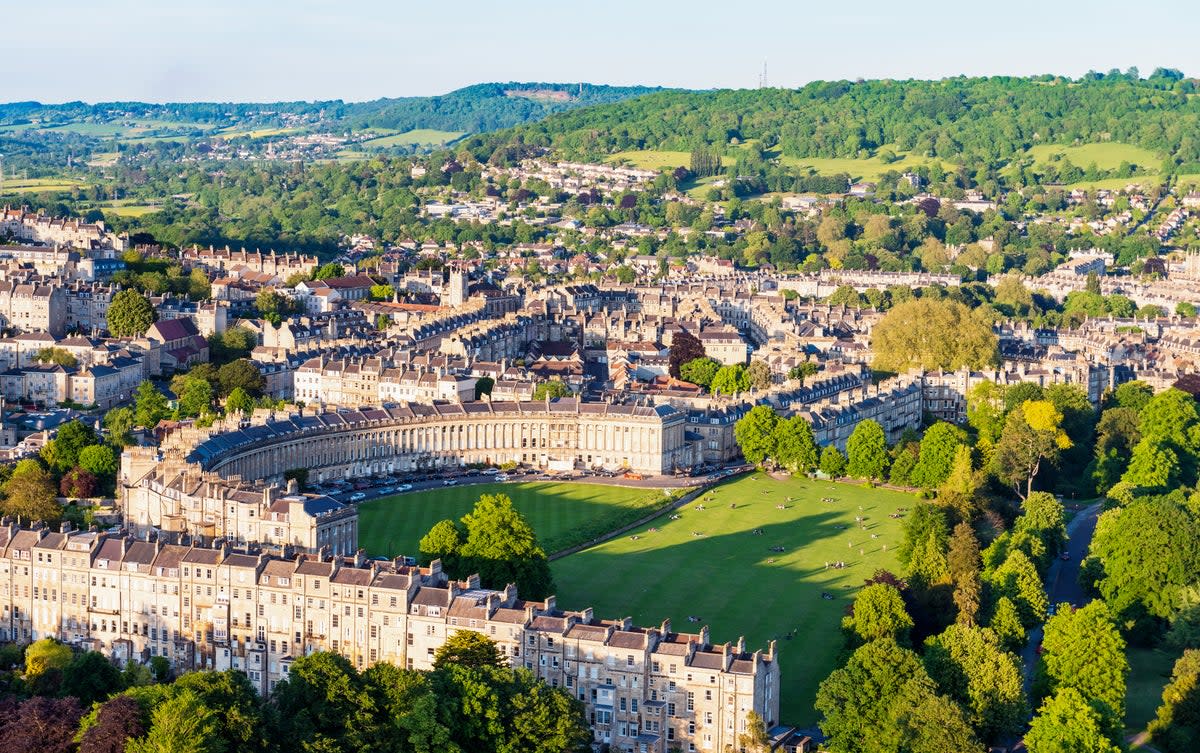
As summer begins to heat up, our TV schedule is about to do the same with the return of Netflix’s wonderfully debauched depiction of Regency life in the much-anticipated third series of Bridgerton. This time back in “the ton”, the story focuses on the (so far) unrequited love interest between Penelope Featherington (Nicola Coughlan) and the third “perfectly handsome” Bridgerton son, Colin (Luke Newton), as Lady Whistledown herself puts it.
Netflix is keeping keen viewers on their toes by drip-feeding the series in two parts, between May and June. Though if you’ve read Romancing Mr Bridgerton by Julia Quinn, on which the streaming giant’s period drama third series is based, you’ll already know what’s coming – just be sure not to share any spoilers with the rest of us.
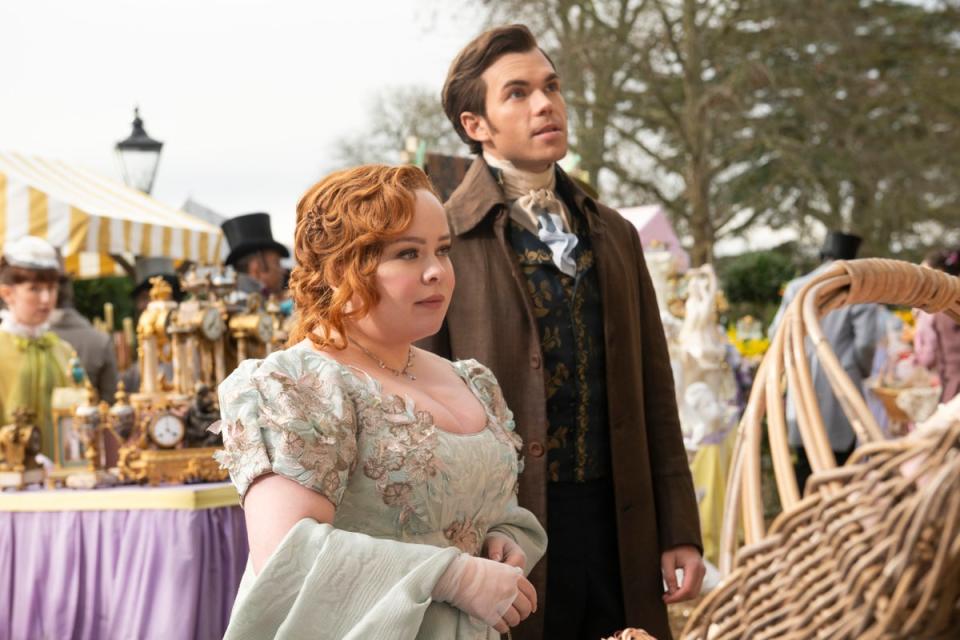
The series is mostly set in London, but it is Bath that forms much of the set for Bridgerton, thanks to its elegant honey-coloured limestone buildings and regal Palladian architecture – all protected by World Unesco Heritage status. It was the city for high society to be seen in, and to see (read, gossip), to “take the waters” of Bath’s natural hot springs, and to promenade about the town and its parks. And as the architecture of the town has changed so little since the early 19th century, there’s plenty to see and do that the aristocratic Georgians would have visited and enjoyed themselves – and it’s easy to visit the real-life spots used in filming too.
So, dear gentle reader, if you’re feeling hot under the collar at just the thought of the new series and need more of a Bridgerton fix, this is where to stay, eat and what to do in the city for a slice of Regency life that’s fit for a Bridgerton.
Read more on UK travel:
The UK’s best spa towns: Where to stay for restoration and relaxation
Hay Festival of Literature and Arts travel guide – things to do, hotels and more
What to do
The Royal Crescent
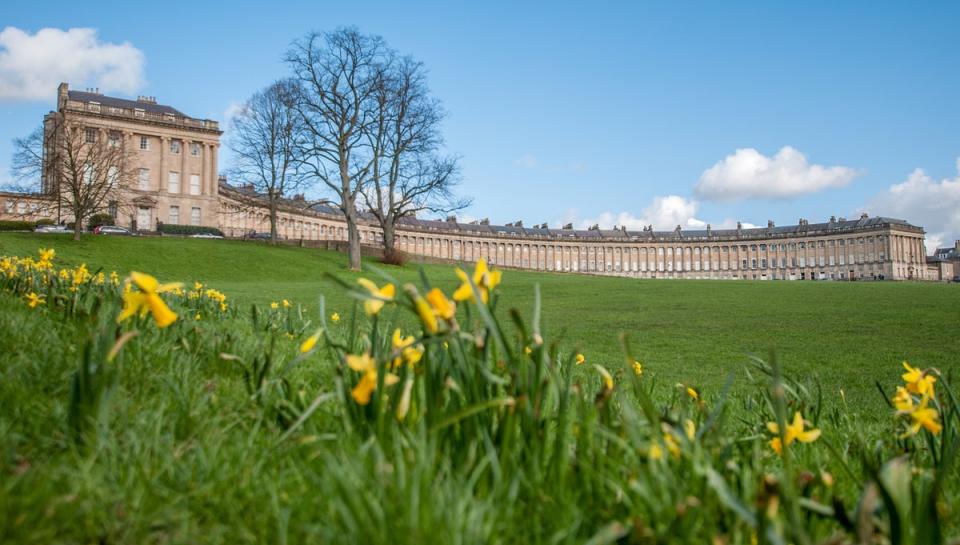
First on the agenda should be perfecting the art of promenading along the crescent imagining you’re part of the ton. The crescent-shaped row of 30 golden-hued stone townhouses has always been one of the city’s signature landmarks, and best addresses, since it was built in 1774 following the vision of architect John Wood the Younger.
So of course it features heavily in the show, not only in the opening credits, but throughout the series – whether it’s in carriages on the way to the ball or promenading with Viscount Anthony Bridgerton and Kate Sharma on horseback. They’re almost entirely private accommodation now, apart from the No 1 Royal Crescent museum and No 16 Royal Crescent Hotel and Spa, where you can book the restaurant or spa as a non-guest, too.
No 1 Royal Crescent
It sits on the end of the famous curve of buildings. Lady Featherington and co make this grand 18th century mansion their home in the TV series, which is supposed to be London’s Grosvenor Square. It was the grandest building of its time, though was quickly rivalled by the houses on Great Pulteney Street. Now it’s a museum, and offers some of the best insights into life, both above and below stairs, in the Georgian period. (no1royalcrescent.org.uk, £15.50)
The Holburne Museum
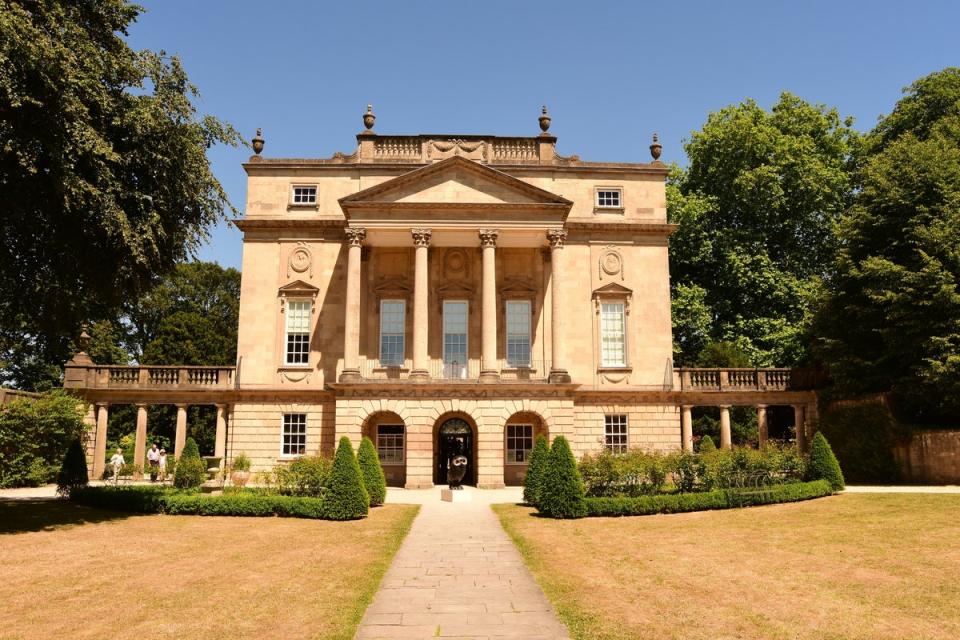
This museum is distinctly recognisable as Lady Danbury’s home in Bridgerton and the backdrop to many balls of the ton, though in real life it’s the grade I-listed Holburne Museum surrounded by the pretty Sydney Gardens. It began life as the Sydney Hotel, remaining as such until the 1830s, when it had to close and was turned into lodgings. It was in 1916 that it was renovated into a museum, and houses everything from Renaissance treasures to masterpieces by Gainsborough and contemporary exhibitions. It’s also home to around 4,000 pieces of art and sculptures from Sir Willliam Holburne, a prolific art collector, who left his collection to the city after his death. (holburne.org, £11)
Prior Park
Walk around this Georgian garden and you’ll forget you’re even in a city. The 18th-century landscape garden covers 57 acres, with the highlight being the Palladian bridge, inspired by Italian architect Andrea Palladio. It’s one of only four in the world and is used numerous times during promenading scenes in Bridgerton, including tense talks between Daphne and Anthony Bridgerton in the first series. (nationaltrust.org.uk, £10)
Bath Thermae Spa
Though not featured in Bridgerton, the high society of the Regency era visited Bath to benefit from its warm mineral-rich waters, whether that was sipping on them in the vast Pump Room restaurant or soaking in them in the adjoining Roman baths. To experience the benefits of the city’s most-prized possession now, book into Bath Thermae Spa. With a 35.5C thermal rooftop pool overlooking the city, it’s one of the best (and most relaxing) views in town. (thermaebathspa.com, £41)
Where to eat
The Abbey Deli
All the ladies worth their salt in the show have their dresses made at Madame Delacroix’s dress shop, Modiste, which is also a hotbed for gossip. The 17th-century glass curved cafe frontage at the Abbey Deli is used in filming, as is the inside. Cafe workers say the TV crew took a week to film the scenes, taking everything out, building the set, filming, and then putting everything back (photos of filming are displayed in the loo).
There’s Bridgerton tea, which is appropriately themed: ahead of their starring roles in season three, Penelope has lemongrass and ginger fusion, which is of course yellow – the only colour dress her mother lets her wear – and Colin’s tea is mint infusion. Aside from the Bridgerton connection, the deli’s baked goods are hearty and well worth a pit stop or to take away – opt for one of the breakfast bacon and egg tartlets. Next door to the right (as you look at the Abbey Deli) is used as Madame Delacroix’s home, too.
The Pantry at Bath Priory Hotel
If there’s one thing that signifies Bridgerton, apart from the gossip, it’s wisteria. Not only does the lilac blossom splendidly adorn the Bridgertons’ main residence (the actual house does exist in Greenwich) seemingly all year round despite its being a spring flower, it features in many other places, including Queen Charlotte’s gardens, making everything look more enchanting. To get a slice of the action now, head to the Pantry terrace at The Priory Hotel, one of Bath’s best hotels, which is drenched in wisteria and just a 20-minute walk from the city centre. On the menu, expect the likes of courgette and chickpea fritters with cardamom yoghurt or Brixham white crab with pear, fennel, kohlrabi and pomegranate.
Sally Lunn’s Historic Eating House
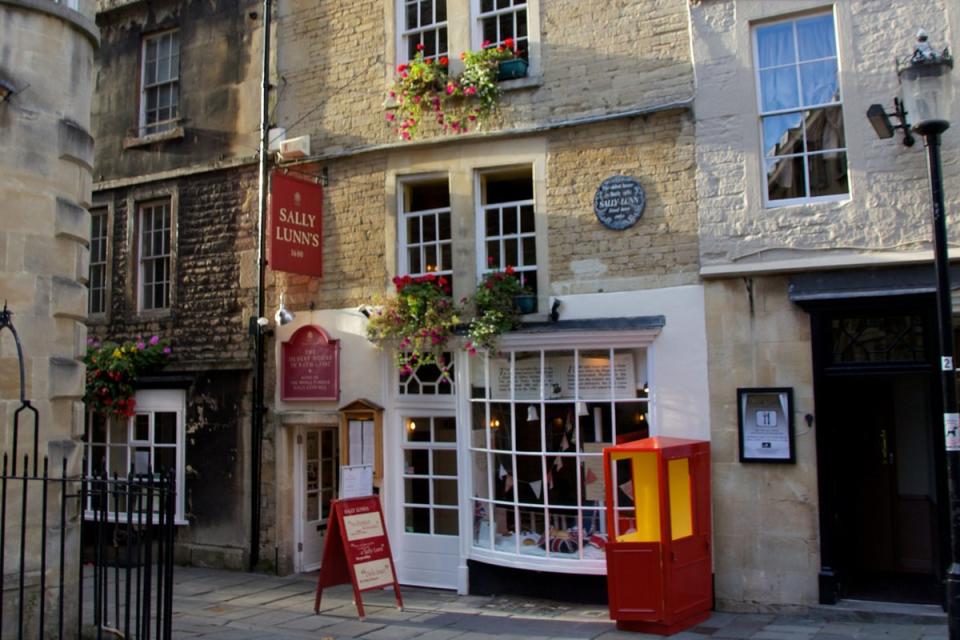
Formerly known as an ‘eating house’, Sally Lunn’s astonishingly dates all the way back to 1680. Here at the cafe, the signature offering is best described as a large round bun, not dissimilar to a brioche burger bun. It is part cake and part bread, and is eaten in halves with whatever you want on top, from scrambled eggs to chocolate spread.
Made to a top secret recipe, the same buns were also served at breakfast at the Sydney Hotel (now Holburne Museum of Art), which Jane Austen herself enjoyed frequently. It’s not just the buns that attract people here though, as the building is the oldest in Bath, dating back to 1482. It is easy to find on the famous North Street Passage, right behind the Abbey, but you’ll no doubt clock the groups of tourists outside taking photos before you see the signs.
Where to stay
Royal Crescent Hotel & Spa
To get a real feel for Regency life, there are few places better to bed down than within the Royal Crescent Hotel & Spa, which is one of the country’s few landmark buildings where you can actually stay. It’s grade 1 listed and is seen frequently in the TV show too, so every time you step outside it you’ll feel like you’re walking into a scene in Bridgerton.
Inside, the hotel’s interiors pack a punch with huge tiled flooring, grand furniture and historic artworks that happily sit among modern bold wallpapering. Spacious rooms are themed with heritage colours, patterns and textures ranging from dusty pinks to sky blues.
With an acre of its own land, which overlooks Royal Victoria Park, it’s easy to forget how central this hotel is. The spa at the back of the garden is a must visit, as is eating at the pastel pink and terracotta Montagu’s Mews restaurant, which reopened in 2023 after a big refurbishment. The biggest highlight has to be the hotel’s own balloon flights that soar above the city.
Lucknam Park Hotel & Spa
Just nine miles from Bath’s city centre, the family-run Lucknam Park is a real countryside retreat and embodies old school elegance. From first driving up the mile-long drive that’s lined with beech and lime trees, the country house absolutely feels fit for a Bridgerton-esque ball.
Rooms in the main Georgian manor house overlook the extensive gardens and onto the 500 acres of the estate beyond. Think four-poster beds, voluptuous silk curtains, and double-sink marble-clad bathrooms with roll-top baths and huge showers. There’s also a handful of cottages with multiple rooms for families. Make sure to check into the spa with its swim-out 30C hydrotherapy pool, which overlooks the impeccable gardens.
Chef Hywel Jones heads up all the food operations, and has held a Michelin star since 2006, though don’t miss the more casual newly opened Walled Garden small-plates restaurant set within the English garden behind the main house.
The Gainsborough Bath Spa
Set right in the heart of Bath, the grade II-listed building at The Gainsborough excels at modern regal elegance. Walking up the huge cantilever sweeping staircase, you’ll feel like one of the Bridgertons at their family home, which has a similar vast staircase of course.
Being the spa city, of course the hotel has a spa, but what is key here is that it’s the only hotel to harness the natural warm spring waters after creating its own borehole. To make the most of it, there’s a hugely impressive spa named the Bath House. The hotel’s vast spa pool is surrounded by soaring columns and it’s one of the grandest spa pools around, complete with its own open-air rooftop pool.
The rooms have high ceilings, plenty of cornicing and panelling and original features and are painted in regal tones of teal and other muted hues, creating a modern take on a Georgian building. The suite rooms even have the thermal waters available on tap, to fill up your roll-top bath.
Read more: Where is Bridgerton filmed? The real life locations to visit for a tour of ‘the ton’


